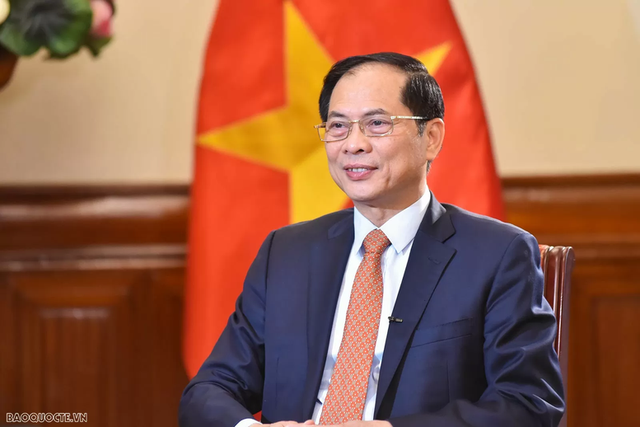Foreign Minister highlights outcomes of Party chief’s visit to Kazakhstan
VGP – Vietnamese Deputy Prime Minister and Minister of Foreign Affairs Bui Thanh Son emphasized that the recent state visit to Kazakhstan by General Secretary To Lam has opened up new strategic opportunities for cooperation between the two countries.

Vietnamese Deputy Prime Minister and Minister of Foreign Affairs Bui Thanh Son - Photo: Baoquocte.vn
Despite geographical distance, Viet Nam and Kazakhstan have maintained a strong traditional friendship and dynamic multi-faceted cooperation. In recent years, these ties have deepened significantly, particularly in economy, trade, and investment.
Kazakhstan is currently Viet Nam's second-largest trading partner within the Eurasian Economic Union (EAEU). In 2024, the two-way trade reached over US$800 million, doubling the figure recorded in 2023. In the first quarter of 2025, bilateral trade volume stood at US$146.3 million, up 18.4 percent fromt the same period last year.
Bui noted there remains vast potential for both sides to further cooperation such as transportation connectivity, with a particular focus on rail transport to facilitate trade flows, sustainable development and climate change response. These areas were enshrined in the Joint Statement on establishment of the Viet Nam-Kazakhstan Strategic Partnership issued on the occasion of the Party leader's visit.
In the face of rising non-traditional security challenges, particularly climate change, both countries are well-positioned to develop a substantive cooperation framework that prioritizes long-term sustainable development. Viet Nam expressed a desire to work closely with Kazakhstan on joint initiatives, including scientific research, green technology transfer, development of a circular economy, and training high-quality human resources in environmental and climate-related fields.
Both sides also reaffirmed their commitment to continue coordination and mutual support at international forums, aiming to amplify the voices of developing nations in building a more inclusive and sustainable global development agenda./.

